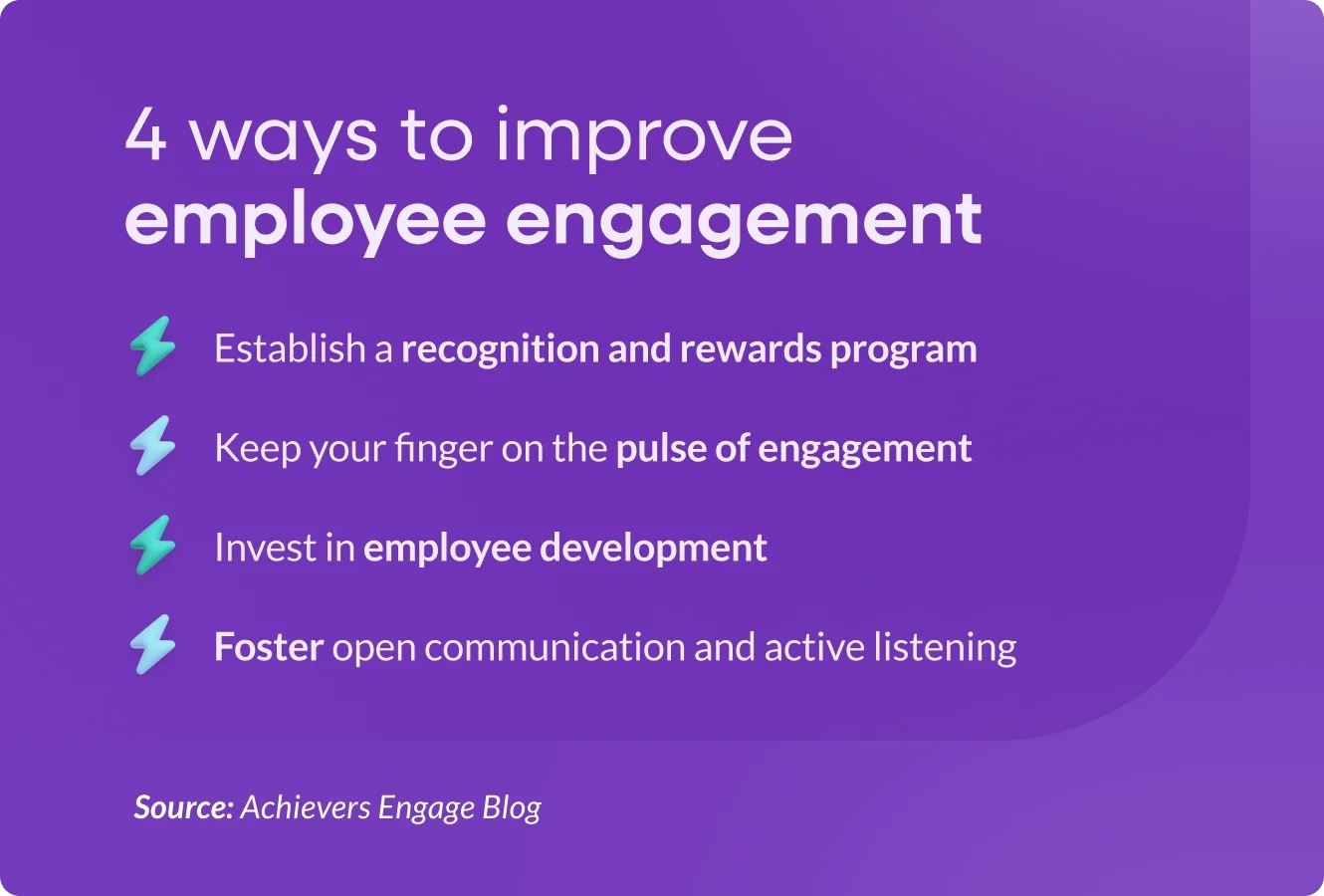Table of contents
Organizations that understand the benefits of employee engagement stand apart from those that don’t. The difference isn’t just about productivity — it’s about creating a workplace where employees thrive, feel valued, and actively contribute to the organization’s success.
Engaged employees show up with enthusiasm, take ownership of their work, and consistently look for ways to innovate and improve. On the flip side, disengaged employees see their role as a paycheck rather than a purpose, leading to missed opportunities, lower morale, and higher turnover.
Want to unlock the benefits of employee engagement? This blog breaks down what engagement means, why it’s essential, and the top 20 benefits it brings. Plus, you’ll get actionable tips and strategies to boost engagement and drive success at your company.
What is the definition of employee engagement?
Employee engagement refers to the emotional connection employees have with their work and organization. Engaged employees are committed, enthusiastic, and motivated to go the extra mile to achieve organizational goals. They’re deeply invested in their work’s purpose and aligned with the company’s mission. High engagement fosters open communication, trust, and transparency, as employees feel comfortable sharing feedback and ideas. It’s also a strategic investment that drives productivity, retention, and continuous improvement. Engaged teams bring innovation, collaboration, and problem-solving to the forefront, making them invaluable to any organization.
Why is employee engagement crucial?
Employee engagement is crucial because it directly impacts productivity, retention, and overall organizational success. According to a recent Gallup report, the global average for engaged employees sits at an abysmal 23%, while the best-performing organizations average 70% engagement; a stark contrast.
Engaged employees are motivated, aligned with company goals, and committed to delivering their best work. They drive innovation, collaborate effectively, and foster a positive workplace culture. High engagement reduces turnover, saving costs and retaining top talent, while boosting customer satisfaction through improved service and quality. It also creates an environment of trust and open communication, where employees feel valued and empowered.
The top 20 benefits of employee engagement
Companies that neglect employee engagement are ceding ground to their competitors across several key drivers of organizational success, despite the many statistics showing the advantages of high engagement. Here are 10 of the multifaceted benefits employee engagement can deliver.
1. Improved employee performance
Engaged employees don’t just fulfill their job responsibilities by rote — they act with enthusiasm and a sense of purpose. Engaged employees are invested in the organization’s success, which motivates them to think critically and creatively about problems. They’re more likely to go the extra mile, proactively seek solutions to challenges, and take initiative in their roles. The sense of belonging that comes from high engagement ultimately leads to increased productivity that shows up in the bottom line.
2. Enhanced innovation
Employee engagement serves as a powerful catalyst for innovation. When employees are engaged, they feel personal responsibility for the organization’s success. This sense of ownership empowers employees to seek out new opportunities to innovate, fueling a culture of continuous improvement and innovation and driving performance to new heights. Employee engagement also promotes collaboration and the free exchange of ideas. Engaged employees are also more likely to participate actively in team discussions, share their insights, and work with colleagues to find creative solutions.
3. Reduced turnover
High turnover is costly, from recruitment and training expenses to the loss of valuable knowledge. Employee engagement is key to retaining top talent and minimizing these challenges. Engaged employees feel connected to their work and the company’s mission, fostering loyalty beyond financial incentives or perks. This sense of belonging and purpose motivates them to stay, reducing turnover and its negative impacts.
4. A stronger organizational culture
Employee engagement plays a pivotal role in developing a company culture that leads to sustained success. Engaged employees are more likely to embody the values and the mission of their organization, striving to achieve its vision. This leads to a ripple effect that inspires others to adopt a similar mindset and work ethic. Moreover, the positive reputation of companies with engaged employees can attract top talent, further enhancing the organization’s competitive position.
5. Improved employee loyalty
Every organization wants to find the recipe for a genuinely loyal workforce, and employee engagement is a key ingredient. Engaged team members develop a bond with their company that transcends the transactional nature of the employer-employee relationship. They believe that the organization actually cares about their well-being, growth, and development, fostering a lasting sense of allegiance to the company and a commitment to its success.
6. Better employee morale
It’s hard to feel truly satisfied at your job if your work doesn’t really motivate you, so it’s no surprise engaged employees are often the happiest. Feeling excited about what you do elevates your work experience like little else. And the enthusiasm of engaged employees is contagious, fostering a positive atmosphere that uplifts the entire team’s spirits.
7. Higher customer satisfaction
Customers can easily sense whether employees are passionate about helping them or simply going through the motions. Engaged employees bring commitment, positivity, and a desire to exceed expectations, creating meaningful customer experiences. They actively listen to feedback, respond with empathy, and focus on solutions, fostering stronger relationships and driving customer loyalty — a key to sustained business growth.
8. More employee advocates
Engaged employees are natural ambassadors for their workplace. They willingly and enthusiastically promote the organization’s values, products, and services to their networks and communities. This attracts top talent and contributes to a positive workplace culture that enhances retention. Their organic advocacy can significantly impact the organization’s brand image and reputation as well, catching the attention of new customers, partners, and even more potential employees.
9. A stronger sense of belonging
Engaged employees foster healthier relationships by empathizing with peers, listening to concerns, and offering support, creating a harmonious, collaborative work environment. They’re also more comfortable sharing ideas and feedback, promoting trust and transparency. This two-way communication ensures everyone feels valued, strengthens their sense of belonging, and reduces workplace conflicts.
10. Improved resiliency and adaptability
Employee engagement plays a pivotal role in enhancing employee resiliency within an organization. Engaged employees tend to be more willing to embrace new technologies, processes, or shifts in company strategy. They’re also more open to learning and upskilling, making them better equipped to navigate and thrive in rapidly evolving environments. This proactive mindset encourages the workforce as a whole to accept change and seize opportunities, helping to ensure the organization’s long-term viability and competitiveness.
11. Lower absenteeism
Engaged employees are more committed to their work, often resulting in fewer absences. When employees feel connected to their tasks and the company’s mission, they’re more likely to show up, both physically and mentally. This dedication reduces absenteeism, ensuring consistent productivity and team cohesion, which ultimately supports organizational efficiency.
12. Enhanced employee well-being
Employee engagement fosters a supportive work environment, positively impacting overall well-being. Engaged employees feel more valued and connected, reducing stress and increasing job satisfaction. When employees’ emotional and mental health is prioritized, they perform better, resulting in a happier, healthier workforce that contributes to long-term success.
13. Greater alignment with organizational goals
Engaged employees have a clear understanding of their role in achieving company objectives. They’re motivated by a sense of purpose, ensuring that their efforts align with the organization’s mission. This deeper connection fosters a unified approach to achieving strategic goals, leading to enhanced productivity and improved organizational outcomes.
14. Higher profitability and revenue growth
Employee engagement directly impacts productivity and customer satisfaction, which in turn drives profitability. Engaged employees go the extra mile to innovate and provide excellent service, leading to better business outcomes. Their commitment fosters a culture of excellence, resulting in higher revenue, reduced costs, and a competitive advantage in the market.
15. Reduced workplace conflict
Engaged employees communicate effectively and collaborate well with their colleagues, minimizing misunderstandings and conflicts. When employees are emotionally invested in their work and relationships, they’re more empathetic and open to others’ perspectives. This reduces tensions and promotes a positive work culture, leading to greater teamwork and less friction.
16. Improved compliance and workplace safety
Engaged employees are more likely to follow safety protocols and comply with regulations because they feel accountable to their organization and colleagues. Their commitment to the company’s well-being ensures a safer, more compliant workplace. Engaged employees actively contribute to maintaining a safe environment, reducing workplace risks and improving overall safety standards.
17. Faster onboarding of new hires
Engaged employees contribute to a welcoming and supportive onboarding process, accelerating new hires’ integration. They’re more likely to take time to guide and mentor new employees, providing the necessary tools and knowledge for success. A smoother onboarding experience increases new hire satisfaction and retention, setting them up for long-term success.
18. Greater alignment with DEIB initiatives
Employee engagement fosters inclusivity by encouraging employees to contribute to diversity, equity, inclusion, and belonging (DEIB) initiatives. Engaged employees understand the importance of these values, creating a culture that embraces diversity and ensures all voices are heard. This alignment drives progress toward DEIB goals, creating a more inclusive and supportive work environment.
19. Stronger cross-departmental relationships
Engaged employees are more collaborative, promoting stronger relationships across departments. Their willingness to share ideas and support colleagues leads to improved communication and cooperation, breaking down silos. This fosters a culture of teamwork that enhances innovation, efficiency, and problem-solving, ultimately benefiting the entire organization.
20. More constructive employee feedback loops
Engaged employees actively participate in 360-degree feedback loops, offering insights that improve workplace processes and performance. Their commitment to the organization drives meaningful contributions to continuous improvement efforts. A robust feedback culture encourages open dialogue, fostering trust and enabling employees to feel their input is valued, leading to enhanced engagement and growth.

How to improve employee engagement
If you’re ready to start leveraging the advantages of employee engagement at your organization, look no further. Here are four easy-to-implement strategies for boosting engagement:
Establish a recognition and rewards program
Acknowledging and appreciating employees for their contributions is a fundamental aspect of enhancing engagement. So implement recognition and rewards programs that celebrate both individual and team achievements. Recognition can take various forms, from verbal appreciation and thank-you notes, to tech-enabled points-based rewards, to larger awards and incentives. The key is to make recognition frequent, specific, and genuine. Publicly recognizing employees’ efforts keeps them motivated and sets a positive example for others, helping to develop a culture of appreciation within your organization.
Keep your finger on the pulse of engagement
Measuring employee engagement is a critical step in understanding the unique factors that drive engagement at your company. Start by adopting a dedicated employee engagement platform with science-backed employee surveys. These surveys consist of a series of questions designed to assess all the key drivers of engagement, so you can see where your organization is doing well and where it should focus its efforts going forward. The anonymity offered by these pulse surveys gives team members the sense of security they need to provide truly honest feedback.
You should also lean into the AI-driven future by selecting a platform that includes an intelligent HR chatbot. This gives employees an always-on channel to provide input whenever the urge strikes them. And it makes it easy to check in with employees on a more frequent basis without interrupting their workflow.
Invest in employee development
Opportunities for professional development empower employees to acquire new skills and advance in their careers. That’s why a talent development program can be such a powerful tool for increasing engagement. In essence, professional development is all about encouraging employees to set personal and professional development goals that matter to them and then providing the necessary resources and support to achieve them. Companies should implement mentorship initiatives, enable employees to take advantage of online courses and other digital learning materials, and even provide funding for continuing education. They should also establish clear paths for career progression for every role at the company, so every team member knows what they have to focus on to take the next step on their professional journey.
Foster open communication and active listening
Creating an environment where employees feel heard and valued is vital for driving engagement. Encourage open communication by establishing regular one-on-one meetings between managers and their team members, hosting town hall sessions, and promoting the use of feedback tools. Managers should practice active listening, ensuring they understand employees’ concerns and ideas and take meaningful action based on the input they receive. By fostering transparency and making employees feel their voices matter, organizations can build trust and strengthen the bond between leadership and teams, ultimately enhancing engagement.
Understand how to drive employee engagement at your company
Making employee engagement a cornerstone of your organization’s success is a long-term project — but your company doesn’t need to go the distance without help. The Achievers Employee Experience Platform has the tools needed to develop a complete picture of what motivates your team members and then guide your leaders to take effective action. It combines the AI-powered feedback channels and reporting capabilities of Achievers Listen with the powerful recognition and reward features of Achievers Recognize. By integrating with the software your employees use every day, the Achievers Employee Experience Platform provides a seamless path to a more engaged workforce.



